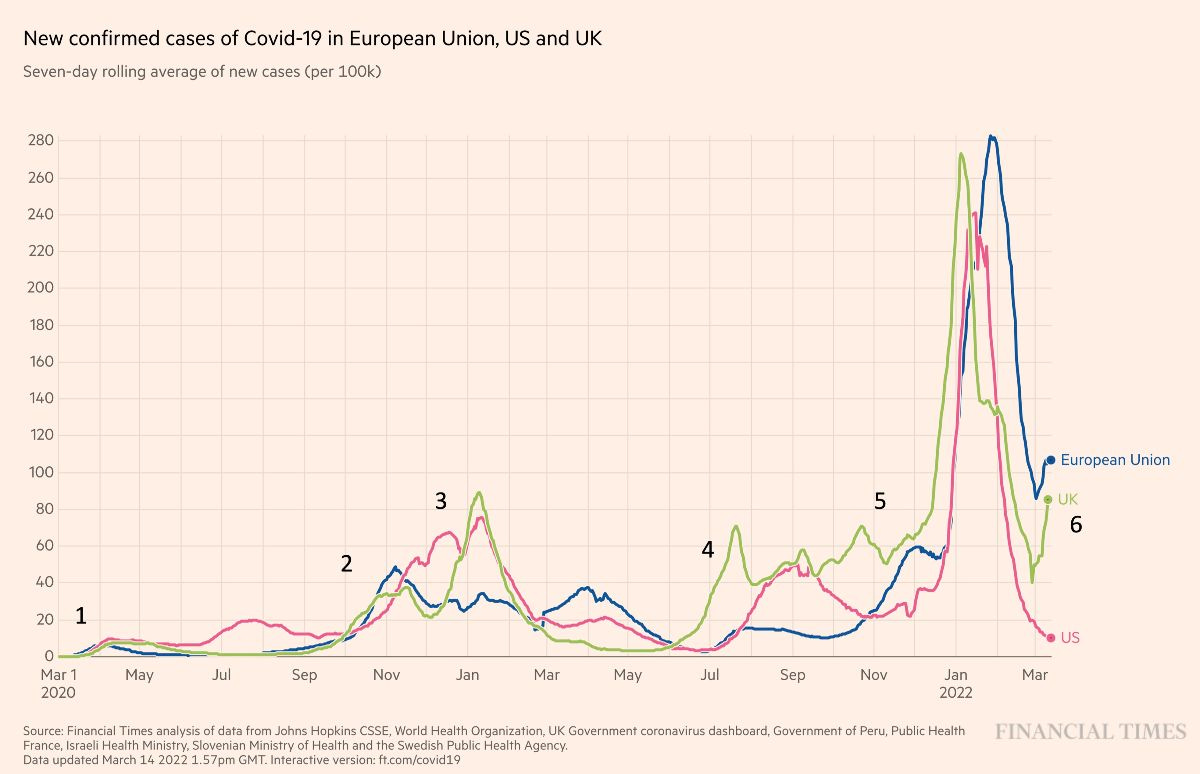Wake Up To Politics - March 15, 2022
Wake Up To Politics: Is another Covid surge coming?
by Gabe Fleisher
Good morning! It’s Tuesday, March 15, 2022. Election Day 2022 is 238 days away. Election Day 2024 is 966 days away.
Is another Covid surge coming?
Covid-19 is, for the moment, quickly retreating in the United States.
New cases and hospitalizations are at some of their lowest levels of the entire pandemic, down 47% and 43%, respectively, from two weeks ago.
Masks are coming off: on March 25, Hawaii will become the last state to lift its indoor mask mandate. (Even here at Georgetown, where Covid restrictions have been slow to change, masks will no longer be required next week.)
Poll after poll show Americans are ready to move on from the pandemic, a message that is arriving in Washington as well. It was evident in President Biden’s recent mask-free State of the Union address, and in reports that the U.S. Capitol is about to reopen to the public after two years of closed doors.
But how long will the current plateau in cases last? Signs from across the pond suggest it may be over soon. Per NBC News, nearly half of all European countries are recording increases in new cases, including an 84% jump over last week’s total in Finland, a 45% rise in Switzerland, and a 32% uptick in the United Kingdom.
The same thing is happening in Asia, where recorded cases in mainland China have reached their highest level since Wuhan in 2020. The virus is currently tearing through Hong Kong as well.
That likely means a surge is forthcoming in the U.S. too. “What happens in the UK and Europe doesn’t stay there,” Dr. Eric Topol of Scripps Research said on Twitter, noting that in the five previous Covid surges, the U.S. trendlines have followed closely behind Europe’s.
Indeed, wastewater sites are already showing that Covid infections may be on the rise in many U.S. cities once again. Here in Washington, several House Democrats have tested positive this week, as has former President Barack Obama.

This latest surge is being driven by — you guessed it — a new variant. Or more specifically, a subvariant: BA.2, which is descended from the BA.1 variant, aka the infamous Omicron. BA.2 has also been nicknamed the “stealth variant,” because it has certain mutations that make it difficult for scientists to tell it apart from other variants during genetic sequencing.
Importantly, studies have found that BA.2 is even more transmissible than the original Omicron strain, which (you might recall) was highly transmissible.
Still, many experts say the next surge in the U.S. won’t look like past ones. That’s largely because of immunity developed from the most recent Omicron surge, as well as from the highly effective vaccines. According to the World Health Organization, previous Omicron infections “provides strong protection against reinfection with BA.2”; per the UK’s public health agency, vaccines are just as effective against BA.2 as Omicron.
One model has estimated that 73% of Americans have developed some form of immunity (vaccine or natural) to Omicron. Based off of what we know now, that should largely carry over to BA.2.
Andy Slavitt, a former Biden Covid adviser, noted on Twitter that severe cases in the new surge will likely be concentrated among those without prior infections, vaccinations, or boosters — meaning that even if cases spike, hospitalizations will likely be even lower than in the Omicron wave.
Still, hospitalizations are currently ticking up across Europe, where many countries have higher vaccination rates but lower levels of prior infection. And the same experts are warning that the U.S., even if it has significant protections, is not doing enough to prepare for another surge.

The BA.2 wave could also have a major economic impact. If you thought you were done with Covid-induced changes to the economy, think again. Due to an increase in cases, China announced a lockdown in the major city of Shenzhen on Sunday.
Shenzhen, home to 17.5 million residents, is a leading tech hub, and the lockdown there will likely have significant consequences on production of phones, cars, and other products. On Monday, Foxconn — one of the top manufacturers of iPhones and other Apple products — closed its operations in Shenzhen. So get ready for more supply chain issues, and more of the price increases that have followed from them.
Take it from Axios chief economic correspondent Neil Irwin, who tweeted: “We’re currently living in the brief moment between when [economists have] realized that the new Covid lockdowns in Shenzhen are going to have hugely bad consequences for US inflation, but that has not yet become a widely-reported conventional wisdom.” (On the other hand, the China lockdowns have pushed oil prices back below where they were before Russia’s invasion of Ukraine.)
As Americans mark the two-year anniversary of Covid reordering our lives, many have declared that they are “done” with the virus. And between vaccines, antivirals, and previous infections, we certainly have a lot going for us headed into the new Covid surge.
But the virus is not yet done with us. Its relationship with our immune systems has certainly changed, but its disruptive impact on our economy and our larger way of living is set to persist far into the future.
Ukraine: “Three European leaders headed to Kyiv on Tuesday to express the European Union’s ‘unequivocal support’ and offer financial help to Ukraine, a dramatic visit that comes as intense fighting rages around the Ukrainian capital.” New York Times
Congress: “Sens. Joe Manchin and Susan Collins will oppose Sarah Bloom Raskin’s nomination to the Federal Reserve’s top job overseeing banks, all but killing her already stalled bid to win confirmation.” Politico
Supreme Court: “Virginia Thomas, wife of Supreme Court Justice Clarence Thomas, for the first time has publicly acknowledged that she participated in the Jan. 6, 2021, ‘Stop the Steal’ rally on the Ellipse that preceded the storming of the Capitol by a pro-Trump mob, raising questions about the impartiality of her husband’s work.” Washington Post

It’s Tuesday, so Wake Up To Politics contributor Kirsten Shaw Mettler is here with the latest education news you need to know:
Florida Gov. Ron DeSantis is expected to sign the so-called “Don’t Say Gay” bill into law. Officially titled the “Parental Rights in Education” bill, the legislation was passed by the state legislature last week.
In its own words, the bill states that “classroom instruction by school personnel or third parties on sexual orientation or gender identity may not occur in kindergarten through grade 3 or in a manner that is not age appropriate or developmentally appropriate for students in accordance with state standards.”
In effect, discussion of LGBT issues in early grade levels would be limited at Florida elementary schools, and parents would be able to sue districts over violations.

Activist and politicians have spoken out against the legislation. Students in Orlando, Tallahassee, and Tampa staged walkouts, protesting the bill. Education Secretary Miguel Cardona said he is “not going to stand by idly” and has hinted at possible funding repercussions for Florida schools if the law moves forward.
DeSantis has defended the bill, saying: “How many parents want their kids to have transgenderism or something injected into classroom instruction? It’s basically saying, for our younger students, do you really want them being taught about sex?”
Disney also condemned the bill, after a week of controversy. The company previously drew national criticism after refusing to respond to the legislation. Disney has donated significantly to DeSantis and other supports of the bill, and has its iconic Disneyworld park and other business operations located in Florida.
Disney changed its stance on Friday, coming out against the bill and announcing a pause in Florida political donations. “I let you down,” CEO Bob Chapek wrote in a letter to employees, apologizing for the delay. “I am sorry.”
All times Eastern.
White House
— President Joe Biden will receive his daily intelligence briefing at 10:15 a.m. He will sign the Consolidated Appropriations Act of 2022 into law at 2:15 p.m. The $1.5 trillion package will fund the federal government through October, while also providing $13.6 billion in aid for Ukraine.
At 5:30 p.m., Biden will deliver remarks at an event marking Equal Pay Day, which is today.
— Vice President Kamala Harris will join Biden for the intelligence briefing and bill signing. At 3 p.m., she will host the White House Equal Pay Day Summit, where she will deliver remarks. At 3:25 p.m., she will participate in a conversation with current and former members of the U.S. Women’s National Soccer Team as part of the summit. Finally, she will deliver remarks at the Equal Pay Day event with Biden.
— First Lady Jill Biden will welcome Eliza Jean Reid, the First Lady of Iceland, to the White House at 5:15 p.m. Later, she will also deliver remarks at the Equal Pay Day event.
— Second Gentleman Doug Emhoff will mark AmeriCorps Week at 12 p.m. by meeting with AmeriCorps members and participating in a community service project at an urban garden and park in Washington, D.C. He will also attend the Equal Pay Day event later in the day.
— White House press secretary Jen Psaki will hold her daily press briefing at 1 p.m.
Senate
— The Senate will convene at 10 a.m. The chamber is scheduled to vote at around 4 p.m. on the confirmation of Shalanda Young to be Director of the Office of Management and Budget (OMB). The chamber will then hold a cloture vote to advance the nomination of Susan Tsui Grundmann to be a member of the Federal Labor Relations Authority.
Finally, the chamber will vote on passage of S.J.Res.37, a resolution by Sen. Rand Paul (R-KY) that would repeal the TSA’s mask mandate for public transportation, which was recently extended through April 18.
— Supreme Court nominee Ketanji Brown Jackson will hold meetings with Sens. Roy Blunt (R-MO), Ben Cardin (D-MD), and Shelley Moore Capito (R-WV) in advance of her confirmation hearings next week.
— On the committee level, the Senate Homeland Security and Governmental Affairs Committee will hold a hearing at 10 a.m. on presidential records management, amid controversy over former President Trump’s handling of his White House records.
House
— The House will convene at 12 p.m. The chamber is scheduled to vote at 2:30 p.m. on 10 pieces of legislation under “suspension of the rules,” a process that allows uncontroversial bills to be fast-tracked as long as they receive two-thirds support:
H.R. 268, to provide for the boundary of the Palo Alto Battlefield National Historic Park to be adjusted, to authorize the donation of land to the United States for addition to that historic park
H.R. 560, the Northern Mariana Islands Residents Relief Act
H.R. 1908, the Ka‘ena Point National Heritage Area Act
H.R. 1931, the Japanese American Confinement Education Act
H.R. 2899, to direct the Secretary of the Interior to conduct a study to assess the suitability and feasibility of designating areas within the island of Guam as a National Heritage Area
H.R. 3113, the Modernizing Access to Our Public Land Act
H.R. 3197, the Save the Liberty Theatre Act of 2021
H.R. 4380, to designate the El Paso Community Healing Garden National Memorial
H.R. 5001, the Upper Colorado and San Juan River Basins Recovery Act
H.R. 6434, the Japanese American WWII History Network Act
Courts
— The Supreme Court is not in session.
That’s it for today. If you enjoy Wake Up To Politics, it’s always appreciated if you donate to support the newsletter or buy some merch. Or if you tell your friends and family to sign up at wakeuptopolitics.com.
If you have any questions or feedback, feel free to email me: my inbox is always open.
Thanks for waking up to politics! Have a great day.
— Gabe



